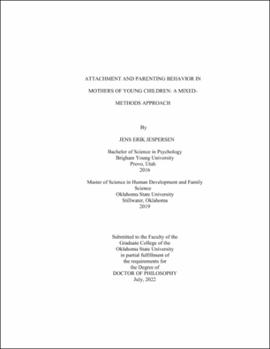| dc.contributor.advisor | Morris, Amanda Sheffield | |
| dc.contributor.author | Jespersen, Jens Erik | |
| dc.date.accessioned | 2023-04-05T16:20:55Z | |
| dc.date.available | 2023-04-05T16:20:55Z | |
| dc.date.issued | 2022-07 | |
| dc.identifier.uri | https://hdl.handle.net/11244/337283 | |
| dc.description.abstract | Attachment representations and attachment styles have each been identified as two of the possible mechanisms involved in predicting parenting behavior. These attachment constructs and their associated outcomes, however, are almost exclusively examined in isolation. As such, attachment styles and attachment representations have not been utilized in the examination of observed parenting behavior simultaneously. The present study contributes to our understanding of adult attachment styles and attachment representations, their influence on one another, and their potential for predicting observed parenting behavior. Considering main study conclusions, it was found that a latent profile analysis of the FMSS-Coherence coding method revealed that mothers can be categorized into four meaningful groups based on attachment coherence. Second, these categories of attachment coherence were found to predict some aspects of self-reported adult attachment, although results were mixed. Third, the four classifications of attachment coherence were found to significantly predict observed parenting behaviors, while self-reported adult attachment styles did not. Fourth, considering attachment representations and attachment styles together produced results that were mixed and largely exploratory, indicating that these relationships are complex and may require further examination. This is the first study to examine the FMSS-Coherence coding method categorically, as it is traditionally used to identify parental attachment representations as either coherent or incoherent. This study showed that by utilizing mixture modeling techniques, applications of attachment coherence could be taken further as indicated by the production of four meaningful groups, including Incoherent, Coherent-Adequate, Coherent-Clear, and Coherent-Comprehensive. Findings from this study suggest that maternal attachment coherence is strongly predictive of observed parenting behavior, which carries implications for the development of coherence-based interventions and parenting programs for mothers of young children. | |
| dc.format | application/pdf | |
| dc.language | en_US | |
| dc.rights | Copyright is held by the author who has granted the Oklahoma State University Library the non-exclusive right to share this material in its institutional repository. Contact Digital Library Services at lib-dls@okstate.edu or 405-744-9161 for the permission policy on the use, reproduction or distribution of this material. | |
| dc.title | Attachment and parenting behavior in mothers of young children: A mixed-methods approach | |
| dc.contributor.committeeMember | Beasley, Lana O. | |
| dc.contributor.committeeMember | Washburn, Isaac J. | |
| dc.contributor.committeeMember | Ciciolla, Lucia | |
| dc.contributor.committeeMember | Chesher, Tessa | |
| osu.filename | Jespersen_okstate_0664D_17784.pdf | |
| osu.accesstype | Open Access | |
| dc.type.genre | Dissertation | |
| dc.type.material | Text | |
| dc.subject.keywords | attachment | |
| dc.subject.keywords | attachment representations | |
| dc.subject.keywords | attachment styles | |
| dc.subject.keywords | infancy | |
| dc.subject.keywords | parenting | |
| thesis.degree.discipline | Human Development and Family Science | |
| thesis.degree.grantor | Oklahoma State University | |
